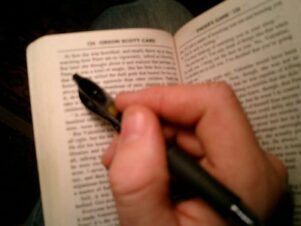Speed Reading or Slow Reading
Article By Antonin Vinkler
 Speed reading has its benefits – it saves time where there is a lack of available hours or days, and the volume of pages is staggering, or where the attractiveness of the content does not exceed that of an instruction manual.
Speed reading has its benefits – it saves time where there is a lack of available hours or days, and the volume of pages is staggering, or where the attractiveness of the content does not exceed that of an instruction manual.
The problem generated by speed reading, though, can be summarised with the following quote from the witty actor and director Woody Allen: “This is how I read War and Peace. It was about Russia.” A remarkable summary for a 1200-page book.
I prefer discussing the “way of reading” and not only the speed. Does a slow pace guarantee quality of reading? Unfortunately, not. You can do a very short exercise – which books have you read, let’s say, two years ago? What were they about? Can you recall five ideas from each of them? In most cases, the answer is “No”. So, what difference does it make if we read fast or slow?
In today’s busy times, I suggest “Mindful Reading”, which includes two simple principles. The first is, of course being mindful. The speed of reading is precisely matched to the speed of awareness. I read to realise. I realise to comprehend. I comprehend to make use of. It obliges me to slow down when I don’t grasp the idea behind the words, to go back over and over to one and the same sentence, and if I did not understand its meaning, to not leave pages and chapters before I am clear about their message.
And thus, poetry requires a slow pace, time for an internal “echo” of rhyme in the soul for capturing the aesthetics of the words. The novel allows for, or maybe even demands, a higher speed in order for us to enjoy the intrigue of the plot. A philosophical book requires breaks, consideration. and sometimes returning to what has already been read, because in the internal building of ideas, there is some brick lacking in the comprehension or a stone for filling in the wide gaps of doubt.
But all types of speed have one common denominator: mindfulness. The consciousness does not fulfil its function without one instrument – and that is focus. It is not speed that is crucial for reading, but focus.
And the other principle: Post Lectio – Ratiocination.
Let’s say we have one hour for reading. If we read for 60 minutes, and after closing the book, immediately go and do something else, we are missing a key element – thinking over the content while we still remember it. Something like a qualitative assimilation of ideas, a mental digestion. Whoever is not used to this can try at least 59/1 compared to 60/0: one minute to think and assimilate. Better, try five, or even better, ten minutes, or why not 30/30 minutes? And if there is nothing to digest and assimilate after reading? Then we can think for a few minutes about the selection of books that we read…
With this mental exercise, we will not only remember ideas from books read, but we will reap a much bigger benefit from their content.
This is an exercise you can start with right away.
I hope you did not read this article too fast.
Antonin Vinkler is Director of New Acropolis in Bulgaria
Image Credits: By Bjorn Bulthuis | Flickr | CC BY-SA 2.0
The entity posting this article assumes the responsibility that images used in this article have the requisite permissionsImage References
By Bjorn Bulthuis | Flickr | CC BY-SA 2.0
Permissions required for the publishing of this article have been obtained




What do you think?